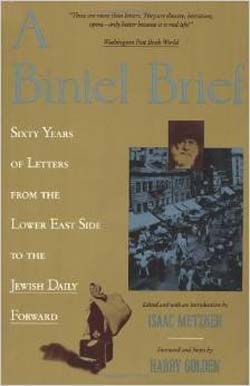By Sheila Orysiek

 SAN DIEGO–In the 1880’s, responding to increasingly harsh conditions in Europe, especially in Eastern Europe, Jewish immigration to the United States became a tidal wave and so, too, did the number of Yiddish newspapers serving them. In 1897, the Jewish Daily Forward (lovingly known as the “Forverts”) began publication which continues to this day, in both Yiddish and English.
SAN DIEGO–In the 1880’s, responding to increasingly harsh conditions in Europe, especially in Eastern Europe, Jewish immigration to the United States became a tidal wave and so, too, did the number of Yiddish newspapers serving them. In 1897, the Jewish Daily Forward (lovingly known as the “Forverts”) began publication which continues to this day, in both Yiddish and English.
“Greenhorns” (new arrivals) often lonely and desperate, turned to the newspaper – sending “Letters to the Editor” asking for information, help, advice or simply expressing a need to communicate. And so began the column: “A Bintel Brief” – a bundle of letters.
Subsequently, a collection of these letters were gathered and published in 1971 as a book: A Bintel Brief: Sixty Years of Letters from the Lower East Side to the Jewish Daily Forward, edited by Isaac Metzker, Foreword and Notes by Harry Golden.
Each a short story (often very well written) of the immigrant’s life, hope, disappointment and fulfillment; triumphs and tragedies. The early letters are concerned with the daily struggle to survive, balancing the need to assimilate – become a part of their new environment -while still trying to maintain the traditions and beliefs of their past or how to cast off that past completely.
One letter is written by a woman who survived the horrific Triangle Shirtwaist fire, others from lone survivors of pogroms. A young woman, thinking she is participating in a ceremony (conducted in English) granting her United States citizenship, instead finds herself married to a man she doesn’t know; white slavery was always a risk.
But by the late 1920’s the letters are more concerned about sending children to college and in the 1950’s, the writers ask for advice on how to reconcile the traditions of parents with their “free thinking” – non-religious grown children. Then life circles about as the next generation – the grandchildren – begin to feel the pull of the religious traditions of their grandparents, sometimes to the horror of their parents. The desperation of the early letters from immigrants is long gone; the later letters express concern with reconciling wealth and conscience.
Each letter is the voice of a living being and hearing that voice humanizes and individualizes that mass of immigrants. This is a poignant and important book.
*
Orysiek is a freelance writer who specializes in arts and literature. Comments may be made in the space provided below this article or sent to the author at sheila.orysiek@sdjewishworld.com
Sheila, this book which i read in my college days was one of my foundations. thanks for telling the news again. — danny in taiwan, where, believe ir or not, Shelia, a professor named Chang Gue-in, a woman, at Wenzao University of Languages, is the Asia expert on Yiddish and often gives academic papers and presenations around the world. Who knew? Yiddish travels far!
Sheila, I have the book! I stumbled across it at a Jewish book sale in Phoenix around 1981. The Bintel Brief was the “Dear Abby” of the Jewish immigrant through the Forvertz. I am so pleased you have given the book the re-attention it so deserves. It is a wonderful reflection of American Yiddishkeit and the concerns of the generation of our grandparents as they were becoming Americans. As an aside, Abraham Cahan, the editor and publisher of the Forvertz for so many years,is one of my favorite personalities in Jewish American history. His influence on the immigrant generation cannot be underestimated and should not be ignored. Thank you for a fine article.
Ed, thank you for your comments and donation. Both help us to continue bringing news and commentary of interest to our readers. — Donald H. Harrison, editor